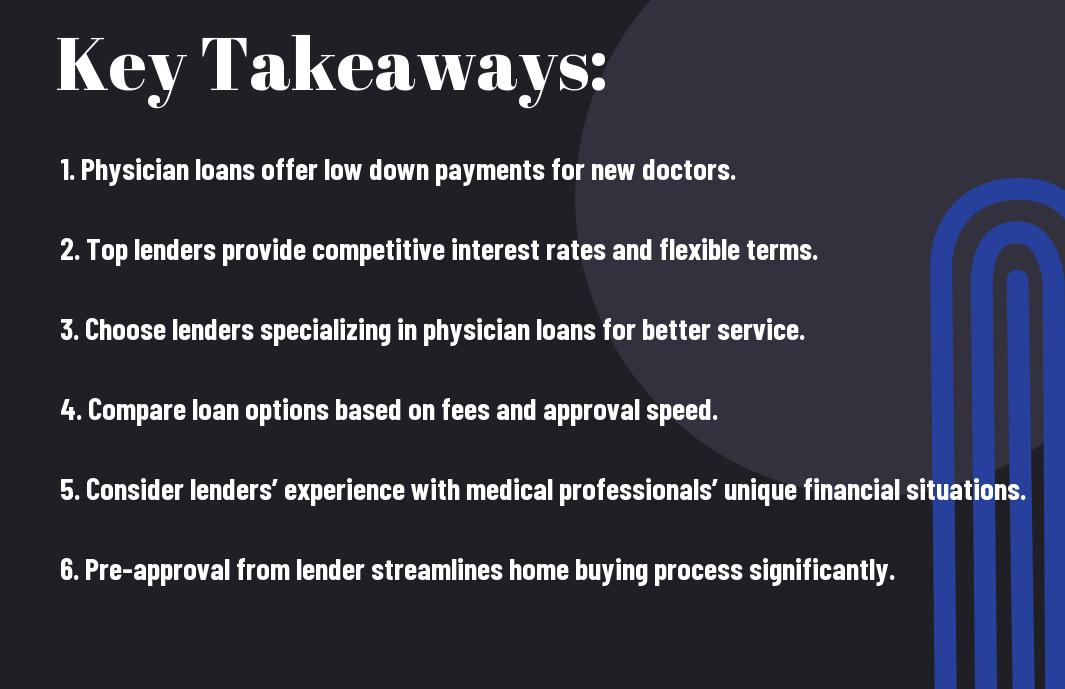With the unique financial challenges you may face as a physician, selecting the right lender for your home purchase can significantly impact your journey to homeownership. This blog post will guide you through the top 5 physician loan lenders tailored to fit your needs. You will learn what each lender offers, along with valuable insights to help you make an informed decision, ensuring you choose a partner that aligns with your financial goals and homeownership aspirations.
Tailored Financing Options: What Physician Loans Offer
Physician loans provide a unique mortgage solution specifically designed to meet the needs of medical professionals. These loans typically require no or low down payments, offer competitive interest rates, and often allow you to secure financing before your residency or fellowship income begins. With these tailored financing options, you can focus on your medical career while making homeownership a viable reality.
Unique Benefits for Medical Professionals
As a medical professional, you face distinctive financial hurdles, including high student loan debt and irregular income during your training years. Physician loans account for these factors, making it easier for you to qualify based on future earning potential rather than current income-only assessments. Additionally, flexible repayment options, no private mortgage insurance (PMI), and higher loan limits create an advantageous environment for you to purchase your first home.
Comparison with Conventional Mortgage Options
In contrast to conventional mortgages, physician loans offer key advantages tailored to your situation. Traditional lenders often emphasize a steady income and a significant down payment, while physician loans take into consideration your future earning potential and student debt. With no PMI required, your monthly costs remain lower, enabling you to allocate funds toward other investments, such as retirement savings or improving your new home.
Comparison of Physician Loans and Conventional Mortgages
| Feature | Physician Loans |
|---|---|
| Down Payment | 0% to 5% |
| Private Mortgage Insurance (PMI) | Not required |
| Income Consideration | Future earning potential accepted |
| Student Loan Impact | Minimized impact on eligibility |
| Loan Limits | Higher limits compared to conventional |
The advantages of physician loans become evident when you analyze how they stack up against conventional mortgage options. While traditional loans emphasize a substantial down payment and consistent income evidence, physician loans ease these burdens, allowing you to qualify more easily even with student loans. With favorable terms like waived PMI and competitive rates, you benefit from greater financial flexibility, necessary for managing life as a physician and home buyer simultaneously.

The Top Contenders: Who Are the Leading Physician Loan Lenders?
As you navigate the mortgage landscape, a variety of lenders stand out for their specialized offerings tailored for medical professionals. Each of these top contenders brings unique benefits and flexible options that cater specifically to your needs as a physician borrower. Whether you are a recent graduate, a resident, or an established physician, exploring the various features of these lenders will help you find the right fit for your home purchase.
Key Players in the Market
Some of the most reputable lenders in the physician loan space include banks and financial institutions like Well Fargo, SunTrust, and Fifth Third Bank. These lenders have established a strong presence by offering competitive rates and favorable terms with little to no down payment options. Understanding the offerings of each lender allows you to make an informed decision when securing your mortgage.
The Criteria for Evaluation
Evaluating physician loan lenders involves considering interest rates, repayment terms, customer service, and eligibility requirements. You should also look at loan structure flexibility regarding various employment types and income projections. Factors such as special promotions or borrower programs could enhance the overall affordability of your mortgage.
When assessing lenders, start by comparing interest rates across several options to ensure you’re getting a competitive rate. Pay attention to the types of loan programs offered, as some lenders specialize in accommodating unique situations like part-time employment or fellowship income. Customer service reputation can also greatly impact your mortgage experience. Check reviews or seek advice from fellow physicians who have successfully navigated the process. Ultimately, aligning a lender’s offerings with your specific needs can significantly influence the ease of your home buying journey.
Diving Deep: In-Depth Reviews of Each Lender
Understanding the features, pricing, and customer experiences of each lender is important for making an informed decision. In this section, you will find comprehensive reviews of top physician loan lenders, helping you navigate through the details of what each one offers. This will assist in aligning your personal and financial goals with their mortgage solutions.
Lender A: Features, Fees, and Customer Feedback
Lender A stands out with its competitive interest rates and flexible loan terms tailored for physicians. With no down payment options, you can secure a loan without depleting your savings. Customers have praised their responsive customer service, often highlighting smooth application processes. However, some fees associated with closing may be higher than industry averages, warranting attention during your decision-making process.
Lender B: Highlights and Drawbacks
Lender B is known for its quick approval times and personalized service, making it a preferred choice for many physicians. However, some customers have reported that while the initial rates are appealing, they may not be as competitive in the long term. Additionally, the lender could have more stringent qualifications, making it less accessible for certain borrowers.
Access to quick approval times is a significant advantage of Lender B, particularly if you’re working against time in a competitive housing market. Personalization in service means you’ll get customized loan options suited for your circumstances. On the contrary, if you don’t meet the strict qualifications, seeking financing elsewhere may become necessary, potentially complicating your home-buying process.
Lender C: Pros and Cons
Evaluating Lender C’s offerings unveils a mix of advantages and disadvantages that you need to consider. Below is a concise breakdown of its key benefits and drawbacks.
Pros and Cons
| Pros | Cons |
|---|---|
| Specialized loans for physicians | Higher credit score requirements |
| Competitive interest rates | Limited branch availability |
| No PMI required | Potentially longer processing times |
| Flexible repayment plans | Fees may be higher than others |
| Great customer service | Documentation requirements can be extensive |
Lender C provides specialized loans catering specifically to physicians, often reflecting competitive interest rates without requiring Private Mortgage Insurance (PMI). Nevertheless, it may necessitate a higher credit score, which can potentially limit options for some borrowers. Additionally, while customer service has been positively noted, the documentation process can be extensive, leading to longer processing times for your application. Balancing these pros and cons will empower you to make the most informed choice in your home purchase journey.
Strategic Selection: How to Choose the Right Lender for Your Needs
Finding the ideal lender is key to ensuring a smooth home buying experience. Start by evaluating your unique financial situation and long-term goals to align them with a lender that offers the best options for your circumstances. Remember to consider factors such as loan limits, interest rates, and the flexibility of repayment terms that suit your future plans.
Assessing Your Financial Situation and Goals
Begin by analyzing your current income, existing debts, and credit score to establish a clear picture of where you stand financially. Understanding your debt-to-income ratio is necessary, as it plays a critical role in determining how much you can borrow. Assess your homeownership goals, whether you plan to buy a starter home or your forever home, to ensure the lender you choose can accommodate your aspirations.
Questions to Ask Potential Lenders
Engaging potential lenders with the right questions can uncover invaluable information about their offerings. Inquire about the loan types they provide, the specifics of their physician loan programs, processing times, and their approval criteria. Understanding their experience with physician loans can help you assess if they truly understand your unique financial challenges and can offer tailored solutions that align with your needs.
Asking about the specifics can yield insights that often go unnoticed. For example, inquire about any additional fees, the lender’s experience working with physicians, and the customer service model they employ. Is the lender part of a larger institution with potentially rigid policies, or a more nimble organization that can cater to your specific needs? Knowing the answers will empower you to make an informed choice that aligns with your financial and homeownership objectives.
The Final Steps: Securing Your Loan and Closing the Deal
After selecting the right lender and financing option, you will navigate the final steps toward securing your loan and closing on your new home. This process typically involves gathering documentation, finalizing terms, and ensuring you understand your loan agreement fully. Staying organized and responsive during this phase ensures a smoother transaction, allowing you to focus on what truly matters—moving into your new space and starting this exciting chapter of your life.
Application Process Essentials
Completing the application process necessitates a detailed understanding of your financial situation. You’ll need to provide documents such as tax returns, pay stubs, and student loan information. Many lenders use an automated system, which can expedite approval times, but it’s wise to prepare for additional verification requests. Having your paperwork organized will greatly ease this phase of your journey.
What to Expect During Closing
Closing is the final step of your home-buying process, where ownership officially transfers to you. You will review and sign a multitude of documents, including the loan agreement, title, and disclosure statements. Plan to be present at the closing meeting with your lender, real estate agent, and possibly the seller, ensuring any last-minute questions are addressed, and you are prepared to officially take possession of your new home.
During closing, expect to pay closing costs, often ranging between 2% to 5% of the loan amount, which may include origination fees, title insurance, and appraisal costs. Taking time to review each document will help you understand your financial obligations and confirm that all terms align with what was previously discussed. While the sheer volume of paperwork can feel overwhelming, being well-informed about each aspect will enable you to confidently seal the deal.
To wrap up
With this in mind, selecting the right physician loan lender can significantly impact your home-buying experience. By considering your unique circumstances and priorities, you can find a partner that not only understands your needs but also offers competitive rates and flexible terms. Make sure to compare your options, ask questions, and leverage available resources to ensure you’re making an informed decision. Your new home is a significant investment, and having the appropriate support can make all the difference in your journey.




